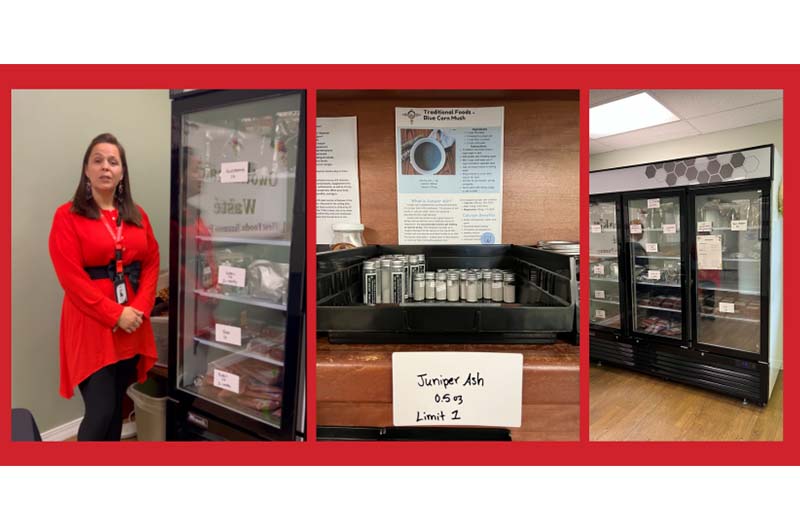First Foods Pantry Supports Indigenous Health

In King County, American Indian and Alaska Native residents experience the lowest life expectancy of all racial groups and report limited access to culturally traditional foods.
Unkitawa, a Kent-based nonprofit founded and operated by an Indigenous board and staff, acknowledges the impact of equitable access to nutritious foods on the health and connectivity of Indigenous communities. Unkitawa’s Indigenous Wellness program promotes whole-person wellness through food, culture, self-help and traditional medicines.
Unkitawa opened Owówičhak’u Wašté First Foods Access Pantry (translated to "a place to nourish the people" in Lakota). This first-of-its-kind program, supported by Public Health -- Seattle and King County HEAL Program's Resiliency Grant, aims to not only dismantle barriers to food access but address the disparate impact of chronic disease among Indigenous peoples due to colonization of Native North American food systems.
Ahead of their pantry's opening in October, Unkitawa collaborated with the American Heart Association to develop nutrition guidelines that help increase the availability of traditional food options that promote whole health and prevent diet-related chronic disease for Indigenous peoples of all tribes in Washington. Their nutrition guidelines meld Unkitawa's lived experiences and knowledge with evidence-based nutritional standards.
In addition to providing immediate access to staple foods, Unkitawa's nutrition guidelines help advocate for ingredients used to host Indigenous recipe demonstrations, encouraging community members to recreate meals at home. To reaffirm cultural ties, Unkitawa offers traditional ecological knowledge to guide community members to use traditional medicines, including tinctures, teas and salves, available through the pantry.
Aligned with their commitment to protect Unci Maka (Grandmother Earth), Unkitawa's nutrition guidelines underscore specific practices for procurement, sourcing First Foods from the local areas in which they are traditionally grown, harvested and hunted.
To increase Unkitawa's capacity to store and distribute fresh, traditional foods like squash, saskatoon berries, buffalo and elk, our collaboration supported the purchase of commercial refrigerators. This addition allows Unkitawa to source an abundance of nutritious food from local Indigenous producers, hunters and farms.
Due to their geographic location, Unkitawa primarily supports South King County communities. But as a testament to the value of their offerings, Unkitawa's programs have supported individuals willing to travel from hours away in rural areas of Eastern and Southwest Washington. Since opening, Unkitawa's pantry has served over 100 families with Indigenous staples that are difficult to access through mainstream suppliers and grocery stores.
"Community members find that foods purchased at grocery stores don't provide the same nutrients as Indigenous made, harvested and produced foods that are native to our diets," said Misty Smiley (Lummi Nation), Indigenous Wellness Manager at Unkitawa. "Recently, a community member shared that this is the first time they've gained access to First Foods in the Pacific Northwest. They explained how it has impacted their health and that they feel blessed and honored to be part of our program."





